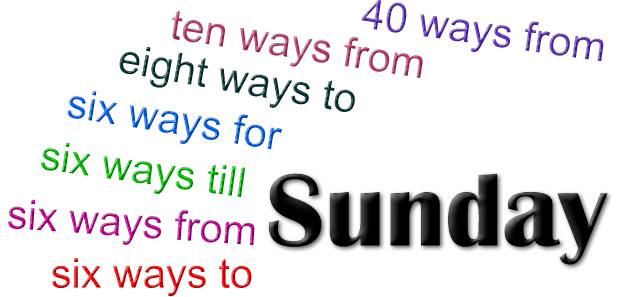
Here’s a recording in a mystery language.
Do you know or can you guess the language?
Six ways to Sunday is apparently an American expression that means ‘in every possible way, with every alternative examined’ or ‘in every possible direction’.
The first meaning can be found in “we checked him out six ways to Sunday before offering him that big loan.” while the second meaning is in “my necklace broke and the beads went six ways to Sunday”.
There are many variants on this phrase involving different numbers of ways ranging from two to a thousand. Some versions use different, both or many instead of numbers, and some replace to with from or for.

According to The Phrase Finder, the earliest known version of the phrase appeared in the American Turf Register and Sporting Magazine in July 1832:
“[The horse] Nullifier, led to the post by a small dry looking man, with a hat that stands nine ways for Sunday, and whose antagonists quake at the sight of that old slouched beaver, as do the Bourbons still at the cocked hat of Napoleon.”
Another example from the same year, which appears in the novel Westward Ho! by James Kirke Paulding goes:
“Look!; they were stitched with a compass that pointed nine ways from Sunday”
The ‘six ways to Sunday’ version first appeared in The Chicago Tribune in November 1925.
World Wide Words quotes an earlier sighting of the phrase in Captain Francis Grose’s Dictionary of the Vulgar Tongue from 1785:
“SQUINT-A-PIPES. A squinting man or woman; said to be born in the middle of the week, and looking both ways for Sunday; or born in a hackney coach, and looking out of both windows; fit for a cook, one eye in the pot, and the other up the chimney; looking nine ways at once.”
According to The Free Dictionary, this phrase means ‘Thoroughly or completely; in every possible way; from every conceivable angle.’ and variants include six ways to Sunday, six ways from Sunday, eight ways to Sunday, eight ways from Sunday, forty ways to Sunday and forty ways from Sunday.
Other variants of the phrase on Wiktionary include every way to Sunday, six ways till Sunday, six ways for Sunday, six ways before Sunday, ten ways from Sunday and nine ways to Sunday.
Have you heard this phrase before? Do you use it? Do you know any similar phrases in English or other languages?
The word antediluvian means:
It comes from the Latin ante- (before) and dīluvium (flood), which comes from dīluō (I wash away) and -ium (a suffix used to form abstract nouns), from dis- (apart, reversal) and lavō (I wash) [source].
The English word deluge (a great flood or rain), comes from the same Latin roots, via the Old French deluge (a large flood), as does the word diluvium (an inundation of flood, deluge; a deposit of sand, gravel, etc made by oceanic flooding) [source].
Other words from the same Latin roots include déluge (The Flood, deluge) in French, diluvio (deluge, downpour) in Spanish, díle (flood, deluge, torrent) in Irish, and dilyw (flood, deluge, destruction, ruin) in Welsh [source].
In Scottish Gaelic dìle [dʲiːlə] can refer to a deluge or flood. The phrase an dìle bhàite means heavy downpour or pouring rain, and the equivalent of it’s raining cats and dogs is tha an dìle ‘s an deàrrsach ann or tha an dìle bhàite ann an ceartair. As an adjective it means endless, for example gu dìlinn means “until the end of time” [source].
Another word for flood is inundation, which comes from the Old from inundacion (flood), from the Latin inundātiō (inuncation, overflowing, flood, crowd of people), from inundō (I overflow, inundate, flood) from in- (in, within, inside) and undō (I surge, flow), from unda (wave, billow) [source].
Undulate and undulation come from the same root, as does und, an obsolete word meaning wave, or in heraldry, a billow- or wave-like marking [source].
The word flood comes from the Middle English flod (river, lake, ocean, flood, rising tide), from the Old English flōd (flowing of the tide, river, stream, water, flood, deluge), from the Proto-Germanic *flōduz (river, flood), from the PIE *pléh₃tus (overflow, deluge), from *pleh₃(w)- (to flow, run) [source].
Cognates in other languages include flod (river, flood, high tide) in Danish, Norwegian and Swedish, Flut (flow, flood, hight tide) in German, and vloed (flood, current) in Dutch [source].
Essuie-tout [e.sɥi.tu] is what you might call paper towels in French. It literally means “wipe-all”, and comes from essuyer (to wipe, wipe down, soak up) and tout (whole, entirely, total, all) [source].
Essuyer comes from the Old French essuier (to wipe), from the Latin exsūcāre from exsūcō (I juice, I dry), from ex- (out, away) and sūcus (juice, moisture) [source].
Such towels are also known as sopalin [sɔ.pa.lɛ̃] in French, which is a genericized trademark that was first registered in 1948 by the Société du papier linge (Linen Paper Company) and comes from the first syllables of the company name [source].
In English they are also known as kitchen towels, kitchen roll or kitchen paper. There may be other names for them as well. What do you call them?
Essuie also appears in essuie-glace (windscreen wiper), and essuie-mains (hand towel). Related words include; essuyer (to wipe, rub away, swab, suffer, experience), s’essuyer (to dry o.s.), ressuyer (to dry, dry out) [source].
You can essuyer une défaite (suffer a defeat), essuyer une rebuffade (suffer a rebuff), essuyer le feu (come under a fire), essuyer un refus (get a refusal), essuyer un revers (suffer a setback) or even essuyer la vaisselle (dry the dishes) [source].
Last weekend I went to Aberystwyth to see a friend. I had a nice time, even though it was cloudy and rained a lot. This is one reason why I didn’t get round to making new episodes of the Celtic Pathways or Adventures in Etymology podcasts.
Unfortunately one souvenir I brought back was a dose of Covid. My friend wasn’t very well when I saw her, and later found out that she had the dreaded virus. I did a test today and found I have it too. It feels like a bad cold or maybe flu. I’ve been at times feverish, coughing, sneezing and lacking in energy and appetite. I hope I haven’t spread it to anyone else.
I hope you all are keeping well.
If something is beyond your ken, it is beyond your knowledge or understanding. The word ken only really appears in this phrase, but in some dialects of English in northern England, and in Scots and Scottish English, ken is more commonly used.

In English ken means to know, perceive, understand; knowledge, perception or sight. It comes from the Middle English kennen (to make known, tell, teach, proclaim, annouce, reveal), from the Old English cennan (to make known, declare, acknowledge), from cunnan (to become acquainted with, to know), from the Proto-West Germanic *kannijan (to know, to be aware of), from the Proto-Germanic *kannijaną (to make known), from *kunnaną (to be able), from the Proto-Indo-European *ǵn̥néh₃ti (to know, recognize) from *ǵneh₃- (to know) [source].
Some related words include:
These are no longer used, rarely used, or only used in some dialects of English.
Kenning also means “A metaphorical compound or phrase, used especially in Germanic poetry (Old English or Old Norse) whereby a simple thing is described in an allusive way.” It was borrowed from Old Norse [source].
Some examples of kenning in Old Norse and Old English include:
Sources: https://en.wikipedia.org/wiki/Kenning, https://en.wikipedia.org/wiki/List_of_kennings, https://projects.iq.harvard.edu/cb45/kennings
There are cognates in other Germanic languages, including:
In Scots ken means “To know, be aware of, apprehend, learn (a fact)”, and comes from the same roots as the English word [source]. Some related words include: